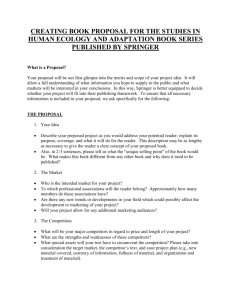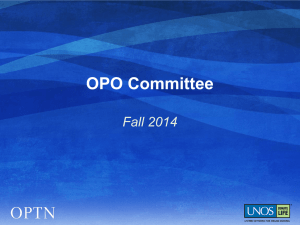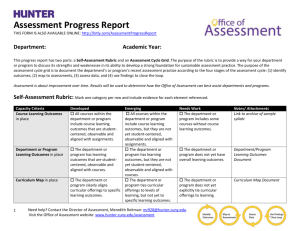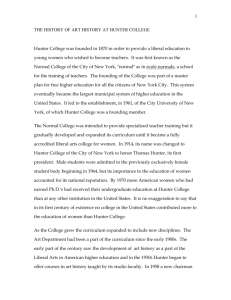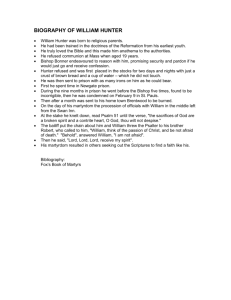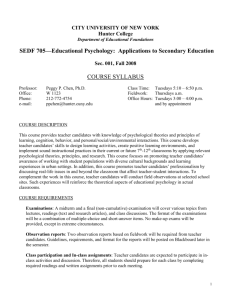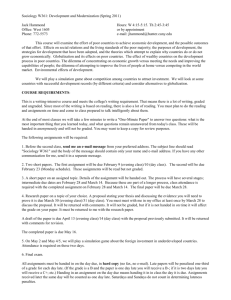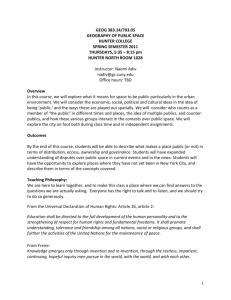BILED 717_Perrone_Fall08 - Hunter College
advertisement
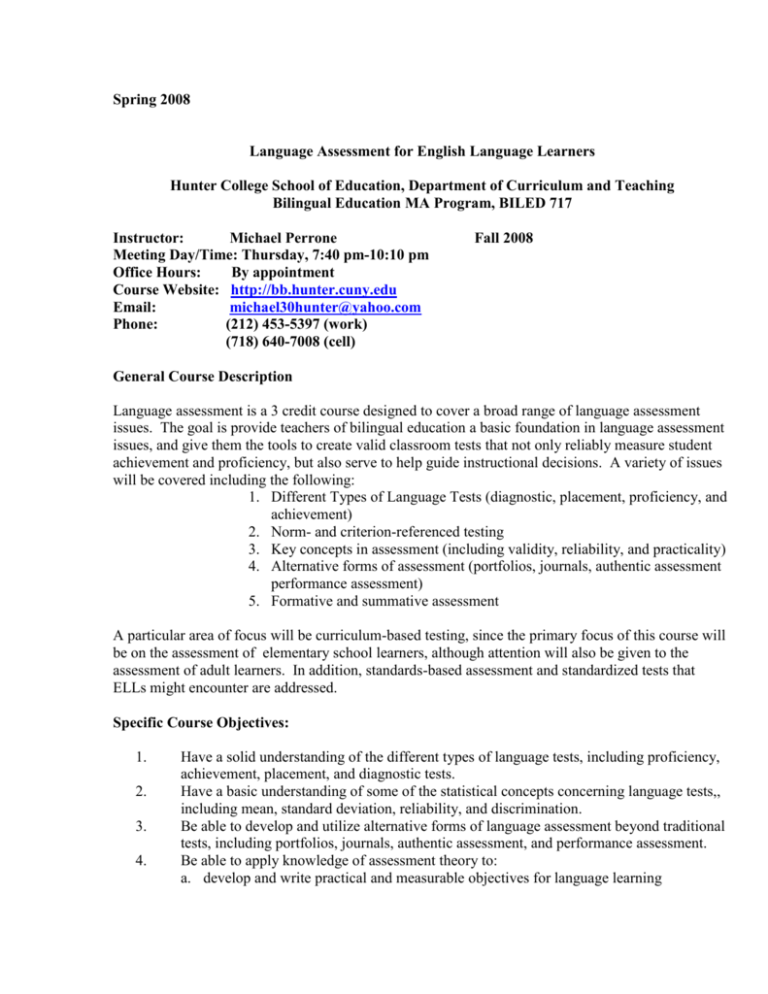
Spring 2008 Language Assessment for English Language Learners Hunter College School of Education, Department of Curriculum and Teaching Bilingual Education MA Program, BILED 717 Instructor: Michael Perrone Meeting Day/Time: Thursday, 7:40 pm-10:10 pm Office Hours: By appointment Course Website: http://bb.hunter.cuny.edu Email: michael30hunter@yahoo.com Phone: (212) 453-5397 (work) (718) 640-7008 (cell) Fall 2008 General Course Description Language assessment is a 3 credit course designed to cover a broad range of language assessment issues. The goal is provide teachers of bilingual education a basic foundation in language assessment issues, and give them the tools to create valid classroom tests that not only reliably measure student achievement and proficiency, but also serve to help guide instructional decisions. A variety of issues will be covered including the following: 1. Different Types of Language Tests (diagnostic, placement, proficiency, and achievement) 2. Norm- and criterion-referenced testing 3. Key concepts in assessment (including validity, reliability, and practicality) 4. Alternative forms of assessment (portfolios, journals, authentic assessment performance assessment) 5. Formative and summative assessment A particular area of focus will be curriculum-based testing, since the primary focus of this course will be on the assessment of elementary school learners, although attention will also be given to the assessment of adult learners. In addition, standards-based assessment and standardized tests that ELLs might encounter are addressed. Specific Course Objectives: 1. 2. 3. 4. Have a solid understanding of the different types of language tests, including proficiency, achievement, placement, and diagnostic tests. Have a basic understanding of some of the statistical concepts concerning language tests,, including mean, standard deviation, reliability, and discrimination. Be able to develop and utilize alternative forms of language assessment beyond traditional tests, including portfolios, journals, authentic assessment, and performance assessment. Be able to apply knowledge of assessment theory to: a. develop and write practical and measurable objectives for language learning 5. 6. b. develop test items that effectively measure the language learning objectives c. apply notions of language learning and instruction to the development of assessment instruments. Have the knowledge to analyze and critique large-scale standardized tests that are presently required in many institutions and the issues related to these tests. Enter and analyze collected data through SPSS How this course addresses the Hunter College Conceptual Framework: As a requirement in the teacher candidate’s course of study to become an ESL teacher, this course requires that the candidate choose a specific area of language assessment to investigate in depth, and to write it up in the form of an academic paper. This research topic may address any, or several, of the areas of the Conceptual Framework, including: 1. Urban Context, by investigated different areas of language learning experienced by students in an urban context, and the effect that standardized testing has on students in this context; 2. Knowledge, Skills, and Dispositions, by applying a knowledge of language, second language acquisition, and second language assessment; 3. Caring Learning Community, by investigating language issues that bilingual students from many different language backgrounds must learn; or 4. Social Justice, by investigating some of the background variables of the bilingual students that might affect their performance on different standardized tests, and that will cause the students to become advocates for fair, reliable, and valid tests, which helps to ensure that ESL students will have better access to educational opportunities in society. Class Activities: This class will include a combination of lectures, interactive discussion, pairwork, and small group work. Active student participation in discussions and small groups is an integral part of this class. Required Textbooks: Brown, H.D. (2004). Language assessment: Principles and classroom practices. White Plains, NY. Longman Education. Brown, J.D. (2005). Testing in language programs: A Comprehensive Guide to English Language Assessment. Upper Saddle River, NY: Prentice Hall Regents. Additional Required Readings: Additional readings will be assigned as required Course Structure: The class will include lectures, teacher-led discussions, student presentations, and out-of-class reading and writing. Active student participation in discussions and small groups is a key part of the class. Study Groups: Students are encouraged to form study groups to review readings, study together for tests, brainstorm ideas, etc. For some activities, students will be asked to work with partners or in groups to complete projects. Email Communication: Please check your email frequently in this course. This will be my way of communicating with you during “off” hours. I check my email daily and will respond to any email within a day, unless I am without internet access. Grading Information: You are expected to come to class prepared. Before class, you should have done all the class readings, worked on the homework problems, and checked your email for any clarifications or updates. 1. 2. 3. 4. 5. 6. On-time Attendance, Class Preparation, and Participation in Class/Group Discussions: Part 1 of Project Homework assignments and quizzes Part 2 of Project (Midterm Project) Part 3 of Project (Final Project) Oral Presentations of Final Project 15% 10% 10% 20% 40% 5% ****Weekly attendance in the class is critical. Except in exceptional circumstances, students will not be permitted to miss more than two classes. If you must be absent or late, please let me know and make arrangements with another student to get class handouts and to help you with the information that you missed. Please come to class on time. Late Papers: Students are strongly urged to submit all work by the due date. There will be a grade deduction for late submissions. Papers more than one week late will not be accepted. No late papers will be accepted for Part 3 of the final paper. Group Work in Class: Students are expected to actively and fully participate in group work in class. Failure to do so will result in the lowering of your overall course grade. Class Project: The project has three parts: 1) Designing a set of language learning objectives 2) Developing an assessment instrument to determine if a real class has actually met these objectives 3) Administering the assessment instrument to a real class of English language learners. Then, the assessment instrument will be evaluated as an assessment tool. The three parts of the assessment tool make up 70% of the class grade. Academic Honesty: (p. 12 of the Graduate Catalog) Any deliberate borrowing of the ideas, terms, statements, or knowledge of others without clear and specific acknowledgement of the source is intellectual theft and is called plagiarism. It is not plagiarism to borrow the ideas, terms, statements, or knowledge of others if the source is clearly and specifically acknowledged. Students who consult such critical material and wish to include some of the insights, terms, or statements encountered must provide full citations in an appropriate form. For this class, APA style will be the required format. Please see the class website for more information on APA style. “Hunter College regards acts of academic dishonesty (e.g., plagiarism, cheating on examinations, obtaining unfair advantage, and falsification of records and official documents) as serious offenses against the values of intellectual honesty. The College is committed to enforcing the CUNY POLICY on Academic Integrity and will pursue cases of academic dishonesty according to the Hunter College Academic Integrity Procedures.” Access and Accommodations for Students with Disabilities: We recommend that all HC students with disabilities explore the support services and register with the OOFICE FOR ACCESS and ACCOMODATIONS. HC students with disabilities are protected by the Americans with Disabilities Act (ADA), which requires that they be provided equal access to education and reasonable accommodations. In compliance with the ADA and with Section 504 of the Rehabilitation Act, Hunter is committed to ensuring this education access and accommodations. For information and assistance, contact the OFFICE FOR ACCESS and ACCOMODATIONS in RoomE1124 or call (212) 772-4857 or TTY (212) 650-3230. Expectations for Written Proficiency: Students must demonstrate consistently satisfactory written English in coursework. The Hunter College Writing Center provides tutoring to students across the curriculum and at all academic levels. For more information, see http://rwc.hunter.cuny.edu. In addition, the Teacher Placement Office in the School of Education offers a writing workshop during the semester and a series of free writing classes are offered to students who are in need of additional support in honing their writing skills. In both cases, stop by Room 1000West for information and dates of workshops.
